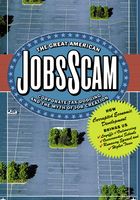
Foreword
William Greider
Some scandals in American political life are difficult to see because they are not hidden. The “scam” that this tough-minded book describes in rather shocking detail is visible to all—if they will take the trouble to examine the public record—but the subject is largely excluded from political discussion. The essence of the crime, as Greg LeRoy explains, can be described as either extortion or bribery, depending on where you sit. A branch of government—state and local, often federal too—bribes a corporation with real money to locate its facility in their jurisdiction, sometimes paying hundreds of thousands for a single job. Or the company may extort the money from the same government as the price of not moving its factory elsewhere. Often the exchange is so transparently fraudulent, it is difficult to say who is the culprit and who is the victim.
The formal name given this scam is “economic development”—fostering new enterprise, creating more jobs—and who could be against that? Taxpayers and workers. They are the true “mark.” Vast sums of public financing are squandered across the nation in transactions that are often no more than a friendly handshake and a press release. Scarce tax revenue is diverted to private interests with no real guarantee that anything at all will be created for the common good. Citizens discover their school systems or hospitals are starved for funding as a result. Workers find that the “new” jobs do not actually appear or that the jobs are, in fact, quite lousy—creating workers without a living wage and thus dependent on tax-financed healthcare or other public relief systems. Or the company decides soon enough to move the factory again to yet another location willing to pay another, still larger bribe. As LeRoy explains, the competition for employment among cities, counties, and states is so intense, the companies typically arrange an auction among them—who will pay the largest bribe?—that is often phony itself, since the company executives have already decided where they intend to locate the plant. They merely jiggle the appetites of mayors and governors so these officials will bid up the price that taxpayers must pay.
This scandal is seldom discussed in politics because most politicians participate in it, both Republicans and Democrats, conservatives as well as liberals. With some regularity, communities discover what’s happening and local protests are mobilized. Sometimes they win redress, manage to block the payoffs, or even retrieve their money from companies that have swindled them. On the whole, however, the American governing system is ensnared by this lose-lose process. The public loses the tax resources to do something real. It loses again when the “deal” turns out to be fraudulent development. This book, I hope, will broaden the ranks of Americans who are actively engaged in stopping the crimes and restoring authentic meaning to the processes of economic development.
Here is a simple proposition to consider as you absorb the facts of the scam: public money should be devoted to public purposes, ideally to long-term improvements that can be expected to benefit everyone, including future generations. After all, that is a central element of why we have government. We need its capacity to undertake large, widely shared projects—achievements that individuals are unable to do alone. This is why government builds highways and sewer systems and schools or creates the infrastructure that will foster genuine economic development. Private enterprise gains enormously from this public investment, in both profits and personal fortunes. Government, in fact, creates business opportunities that private enterprise will pursue and expand.
But the subsidy system in American governance has now become so distorted—actually deranged—that it largely amounts to a corrupt pork barrel of private favors at public expense. Challenging this larger scandal—forcing both political parties to get honest about the true damage to the public interest—is obviously most difficult politics. It is going to require a sustained, smart, and patient movement that unites people across party lines and diverse interests.
If this book makes you angry, as I expect it will, that is a good thing. Anger is the first step toward action. Get angry and join the diverse army of citizens forming up to reclaim the public good.
William Greider is author of The Soul of Capitalism: Opening Paths to a Moral Economy (Simon & Schuster) and national affairs correspondent for The Nation magazine.